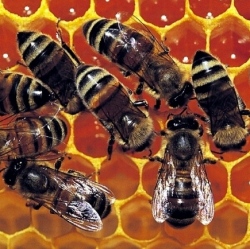
Britain’s urban areas are home to more types of wild bee than farmland, a study has found. Flowers planted in gardens and allotments provide a valuable food source for bees across the year, according to research. Scientists counted honey bees, bumble bees and other pollinating insects, in and around some of the UK’s largest towns and cities.
Urban habitats can provide a valuable role in bee conservation, they say. Honey bees, bumble bees and other insects that pollinate plants are under threat from habitat loss, pesticides and diseases. But new research suggests that bees and other pollinating insects thrive as well in towns and cities as they do in farms and nature reserves.
A team led by Dr Katherine Baldock of the University of Bristol said urban landscapes, making up 7% of the UK – deserve more attention in the drive to protect bees from decline. "Urban areas could be managed in a way to be good to pollinators," she told BBC News. "What we need to know next is which habitats within urban areas are good for pollinators."
While farms are often planted with swathes of one crop, gardens and allotments provide a mixed source of flowers across the year, which is a valuable habitat for insects, she added.
